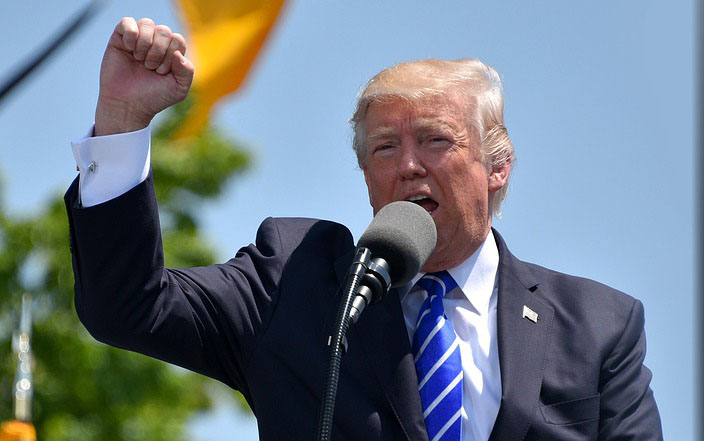
US froze military aid to Kiev because Zelensky took it for granted — intelligence chief
Mar 12, 2025
by Lars Banilue Apr 11, 2025

U.S. President Donald Trump displays a signed executive order imposing tariffs on imported goods at the White House on April 2, 2025, in Washington.
Having already dealt a heavy blow to global stock markets, fear over the downsides of U.S. tariff policies has left investors expecting the worst as President Donald Trump's trade war roils economies worldwide and creates short- and long-term uncertainty.
It is likely to take some time until the market digests (the tariffs') impact on the economy and corporate earnings.
Depending retaliatory steps that could be taken by U.S. trading partners and possible expanded levies by Washington. It may be difficult for the market to turn for the time being.
The damage was just as bad on Wall Street, with the Dow Jones Industrial Average nosediving 5.5 percent on Friday, following a 4 percent drop a day earlier, as China announced retaliatory measures in response to Trump's tariffs.
Since returning to the White House in January, Trump has introduced various types of duties, including an additional 25 percent tariff on cars produced outside the United States and 25 percent levies on all steel and aluminum imports.
He has targeted friend and foe alike, with allies and key trading partners such as Canada, Mexico and Japan, Europe not spared.
Under his latest measure, all countries are facing a baseline duty of 10 percent, with Japan being hit by a much higher rate of 24 percent.
The return of Trump to office was perceived by the market as a net positive, given his expected pro-business and low-tax stances. However, the optimism that prevailed in the market before his inauguration has turned to wariness as reality has set in."Sentiment among institutional and individual investors has deteriorated sharply, prompting them to react negatively to the stance of President Trump, who has been aggressively imposing tariffs at a relatively fast pace.
Investors now realize that the economy could be hit harder than they had imagined.
Reflecting such fears, investors have begun moving from equities to assets considered less risk-exposed, leading to the yen's strengthening against the dollar. This further dented export-related companies like automakers due to the prospect of lower overseas earnings when repatriated.
Bank shares have also been sold heavily amid concerns about deteriorating profit margins caused by lower interest rates.
When there is a significant change in surrounding environments, the outlook for the economy and prices is likely to change accordingly fueling speculation that the central banks will forgo a rate hike at its next policy meeting soon.
The outlook for tech shares that had been a main driving force behind the index's rally last year has also darkened, as Nasdaq heavyweights have struggled to recover from a blow delivered in January by Chinese artificial intelligence startup DeepSeek.
After the release of DeepSeek's AI model, reportedly developed and operated at significantly lower cost than its U.S. rivals, caused shockwaves, doubts remain whether the tech giants can recoup their massive outlays on AI development and training, brokers said.
Amid mounting negative incentives, investors are focusing on how world leaders will react to the U.S. tariffs, as many countries now face the need to engage in talks with Washington. What is now needed are negotiations that would help minimize the adverse impact of the tariffs on the global economy.

Mar 12, 2025

Mar 01, 2025

Mar 24, 2025

Mar 20, 2025

Mar 01, 2025

May 10, 2025

Sep 15, 2025

Apr 14, 2025